News
MARIHE NEWS
Successful Theses and Emerging Alumni in Higher Education Pedagogy
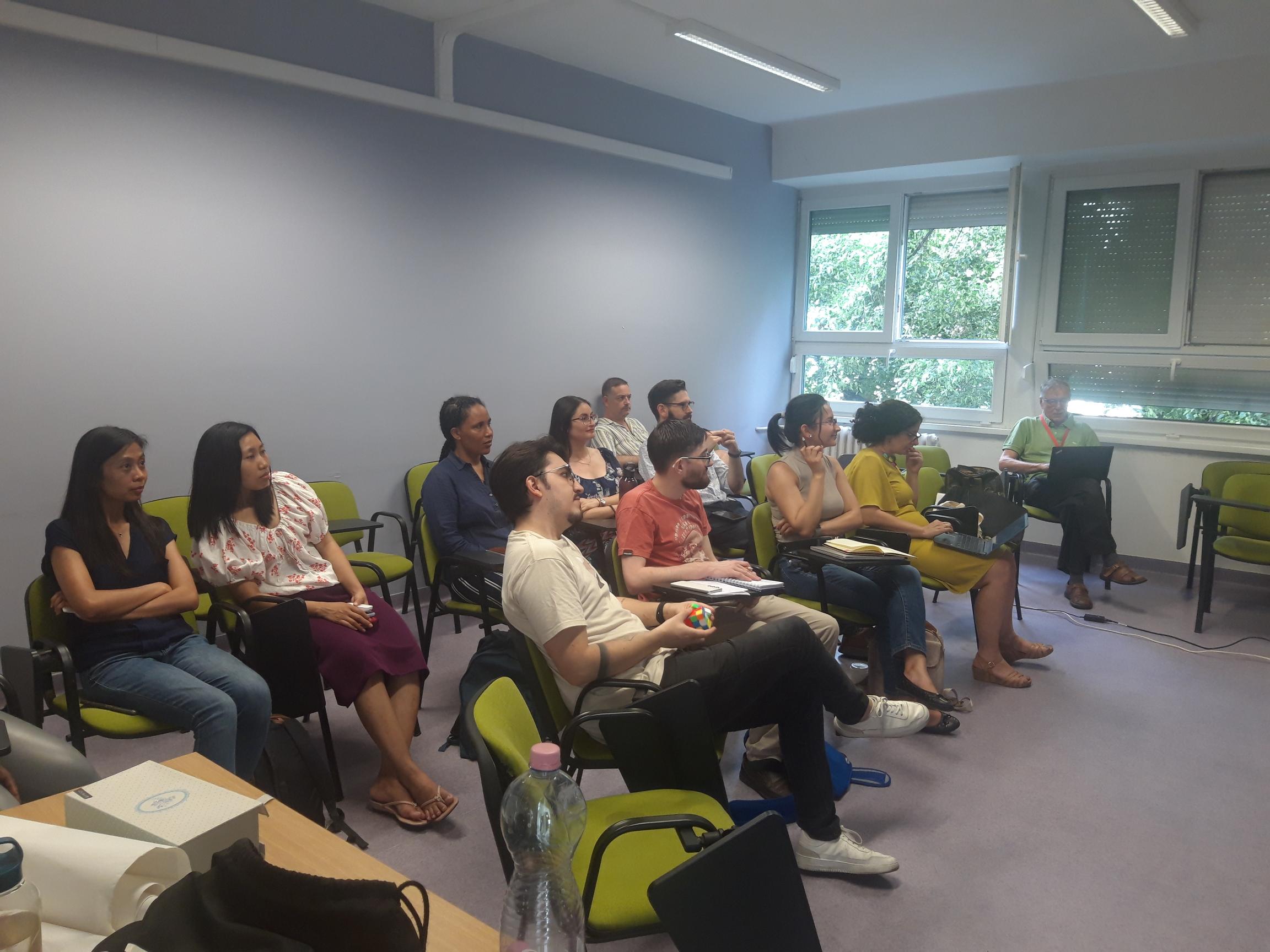 On June 26, a week after their successful final exams, which included the awarding of two honorary degrees, MARIHE students showcased their achievements in innovative, research-based higher education pedagogy to a broader audience. They facilitated discussions on the relevance, best practices, and challenges of game-based learning, off-site learning, intercultural competence development, and democracy education in higher education. The event was also attended by students from previous MARIHE cohorts based in Hungary, highlighting the importance of this milestone in the professional development of MARIHE students and alumni specializing in Learning and Teaching.
On June 26, a week after their successful final exams, which included the awarding of two honorary degrees, MARIHE students showcased their achievements in innovative, research-based higher education pedagogy to a broader audience. They facilitated discussions on the relevance, best practices, and challenges of game-based learning, off-site learning, intercultural competence development, and democracy education in higher education. The event was also attended by students from previous MARIHE cohorts based in Hungary, highlighting the importance of this milestone in the professional development of MARIHE students and alumni specializing in Learning and Teaching.
Thesis seminar for MARIHE students
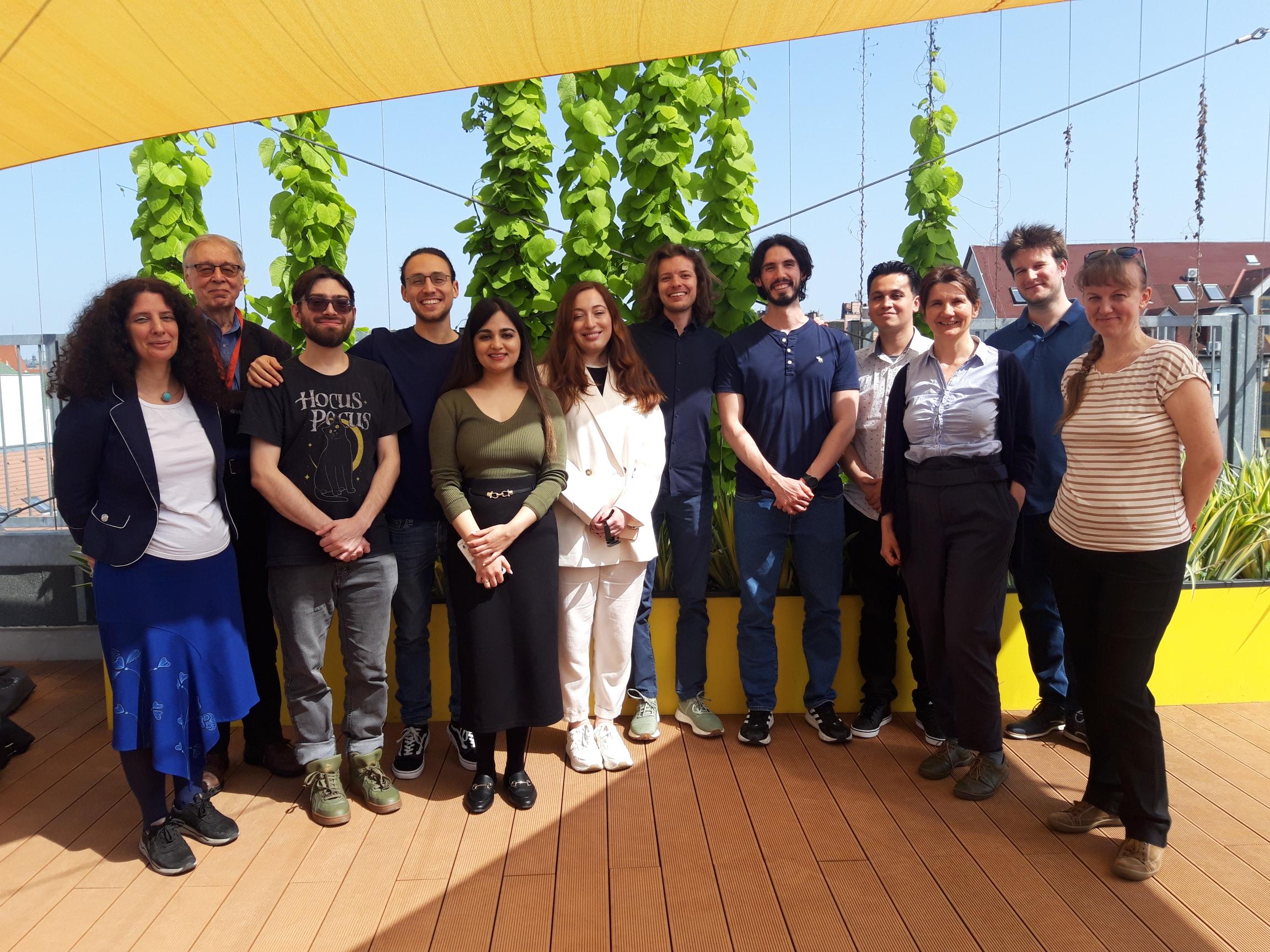 On 12 April the ELTE students specializing in Learning and Teaching engaged in a joint master thesis seminar with peers specializing in Institutional Research in Krems within the MARIHE program. They showcased their research in dynamic 5-minute presentations, fostering a vibrant professional discourse. This session provided students with a platform to refine their ability to succinctly convey their findings and receive valuable feedback from peers, supervisors, tutors, and external participants. Additionally, it served as a preparatory forum for the upcoming oral examination, instilling students with confidence. the joint seminar was facilitated by Corinna Geppert from the University of Continuing Education, Krems and by Orsolya Kálmán and László Horváth from ELTE.
On 12 April the ELTE students specializing in Learning and Teaching engaged in a joint master thesis seminar with peers specializing in Institutional Research in Krems within the MARIHE program. They showcased their research in dynamic 5-minute presentations, fostering a vibrant professional discourse. This session provided students with a platform to refine their ability to succinctly convey their findings and receive valuable feedback from peers, supervisors, tutors, and external participants. Additionally, it served as a preparatory forum for the upcoming oral examination, instilling students with confidence. the joint seminar was facilitated by Corinna Geppert from the University of Continuing Education, Krems and by Orsolya Kálmán and László Horváth from ELTE.
Workshop with Corinna Geppert
 On April 11th, as part of the MARIHE Erasmus Mundus Joint Master in Higher Education Innovation and Management Research, Corinna Geppert, a lecturer at the University of Continuing Education in Krems, delivered a widely attended presentation on the possibilities of work-based learning in higher education. She showcased exemplary practices from an international project and shared compelling international examples of innovative methods for student inclusion in higher education. The audience, comprising over twenty international Master's students, also included lecturers and PhD students
On April 11th, as part of the MARIHE Erasmus Mundus Joint Master in Higher Education Innovation and Management Research, Corinna Geppert, a lecturer at the University of Continuing Education in Krems, delivered a widely attended presentation on the possibilities of work-based learning in higher education. She showcased exemplary practices from an international project and shared compelling international examples of innovative methods for student inclusion in higher education. The audience, comprising over twenty international Master's students, also included lecturers and PhD students
MARIHE students attending a summit on AI in Education
On February 22nd and 23rd, students of the Master in Research and Innovation in Higher Education (MARIHE) participated in TrainDL, a summit on teaching data literacy and AI competencies held in Berlin. Marking the end of a 3-year project involving partners from Austria, Germany and Lithuania, the initiative involved professors, policymakers and students in discussions around a variety of emergent issues on the use of AI in the classroom.
Among the summit’s activities, MARIHE students also presented a poster about a game developed during the two courses of the “Learning and Teaching” specialisation at ELTE, led by Orsolya Kálmán and István Vilmos Kovács. The game immerses participants into a fictitious scenario to explore the implications of adopting generative AI tools in institutional leadership and learning and teaching in higher education. Across five quests, players identify challenges and explore solutions for AI integration into course development.
Panel discussions tackled AI from different perspectives. Instilling AI awareness in diverse educational communities, creating international regulations on the use of AI and shaping the curriculum to integrate data competencies, resulted to be key elements to consider. Ultimately, the participation at the summit underscored the importance of educational stakeholders’ reflection on the impact of AI, repositioning their practices to meet the new demands posed by technological development and its societal implications.
Annual opening symposium with the introduction of the new cohort of MARIHE students
On 14-15 September, the traditional two-day annual symposium of the Erasmus Mundus joint Master's programme MARIHE (Master in Research and Higher Education) took place, this time online. On the first day, participants heard about changes and current challenges in the higher education systems of the partner countries participating in the MARIHE programme, presented by the academic directors of the partner universities. Gábor Halász from ELTE gave a presentation on "Higher education in Hungary - current developments". The presentations were followed by a panel discussion.
On the second day, the students of the new cohort gave poster presentations about the higher education systems of their own countries in the light of the changes of the past 5-6 years, current and future challenges, using the equaliser model of de Boer, Enders and Schimank. The study by de Boer, Enders and Schimank is available here.
The students will spend the first two semesters at the Danube University Krems in Austria, and at the Tampere University in Finland. Those students who will chose the ELTE specialisation in Learning and Teaching will arrive at the PPK next autumn.
MARIHE students on the Teaching and Learning specialisation of the Education Science MA
The first cohort of MARIHE students choosing the Learning&Teaching track of the Education Science MA programme graduated the spring semester of 2020-2021 academic year at ELTE. The students spent 2 semesters at ELTE and will receive the double degree of ELTE and the Tampere University, Finland. Students were asked about their experiences and feedback, and we talked about the courses, the faculty, supervisors, student life, the pandemic and more.
If you are interested, click on this 30 minutes video.
SUCCESSFUL MARIHE VISTING SCHOLARS WORKSHOPS ENDED IN JUNE
Helga Dorner, Ph.D (ELTE PPK): Teaching and Learning, Pedagogic Innovations and Academic Development in Higher Education
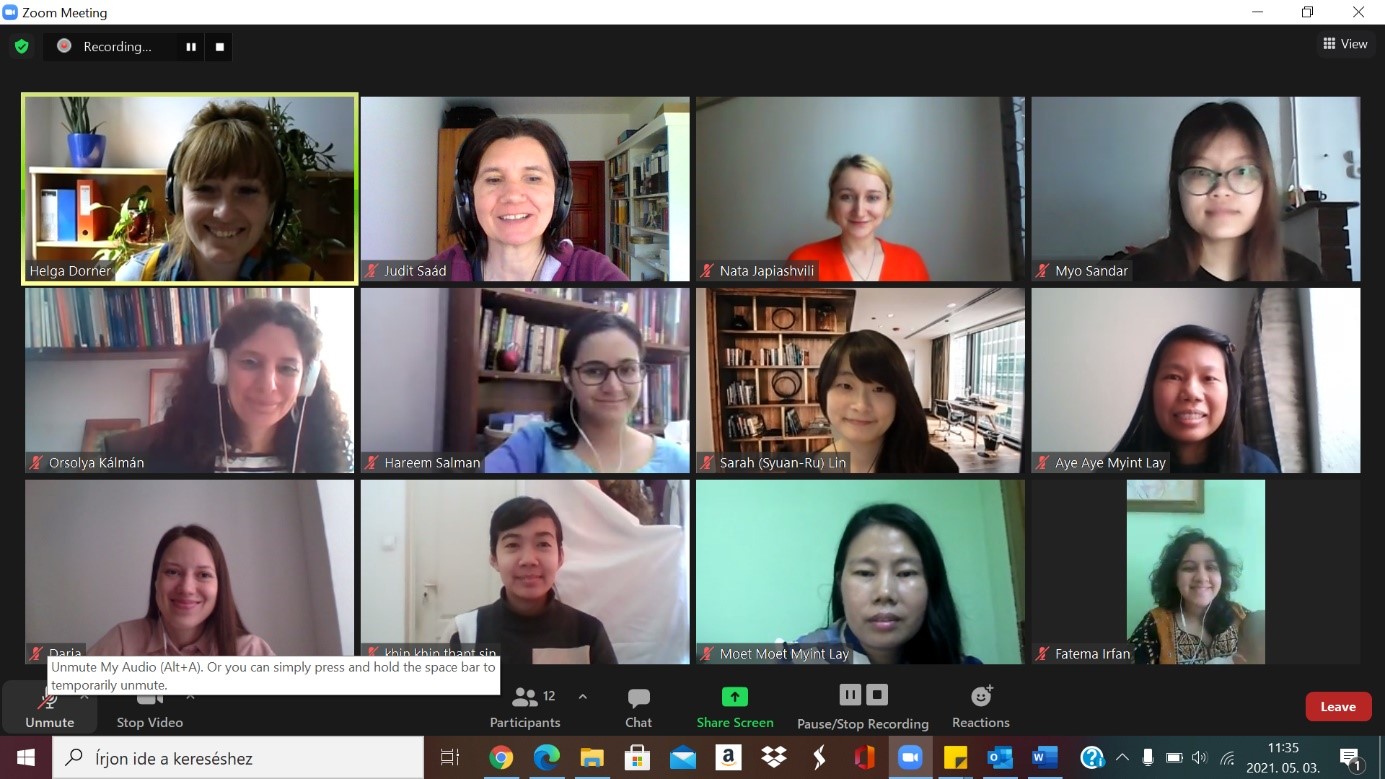 Ass. Prof. Helga Dorner’s workshop focused around the main questions: 1) How to develop a university’s teaching and learning? 2) What are sites and stakeholders to be involved? 3) How can these activities be assessed? 4) How may evidence-based enhancement of teaching and learning be done?
Ass. Prof. Helga Dorner’s workshop focused around the main questions: 1) How to develop a university’s teaching and learning? 2) What are sites and stakeholders to be involved? 3) How can these activities be assessed? 4) How may evidence-based enhancement of teaching and learning be done?
The ten participants worked together actively based on the rich input provided by the lecturer and supported by several important literature in the field, looking at impact evaluations of educational development programs and making reflections on two university cases (MIT and Helsinki University).
- Stensaker, B., Bilbow, G. T, Breslow, L., Vaart, L. (2017). Strengthening Teaching and Learning in Research Universities, Strategies and Initiatives for Institutional Change. Springer International Publishing AG
- Gibbs, G (2013). Reflections on the changing nature of educational development. International Journal for Academic Development, 8:1, 4-14,
- Kreber, C., Brook, P. (2001). Impact evaluation of educational development programmes. International Journal for Academic Development, 6:2, 96-108,
10, 11 May 9am-10.30am
Prof. Liu Baocun (Beijing Normal University): The Partner Assistance Project: an Attempt to Promote Balanced Development in Higher Education Between the West and the East in China; The Supervisor-graduate Student Seminar: A New Approach to Improve The Quality of Graduate Education
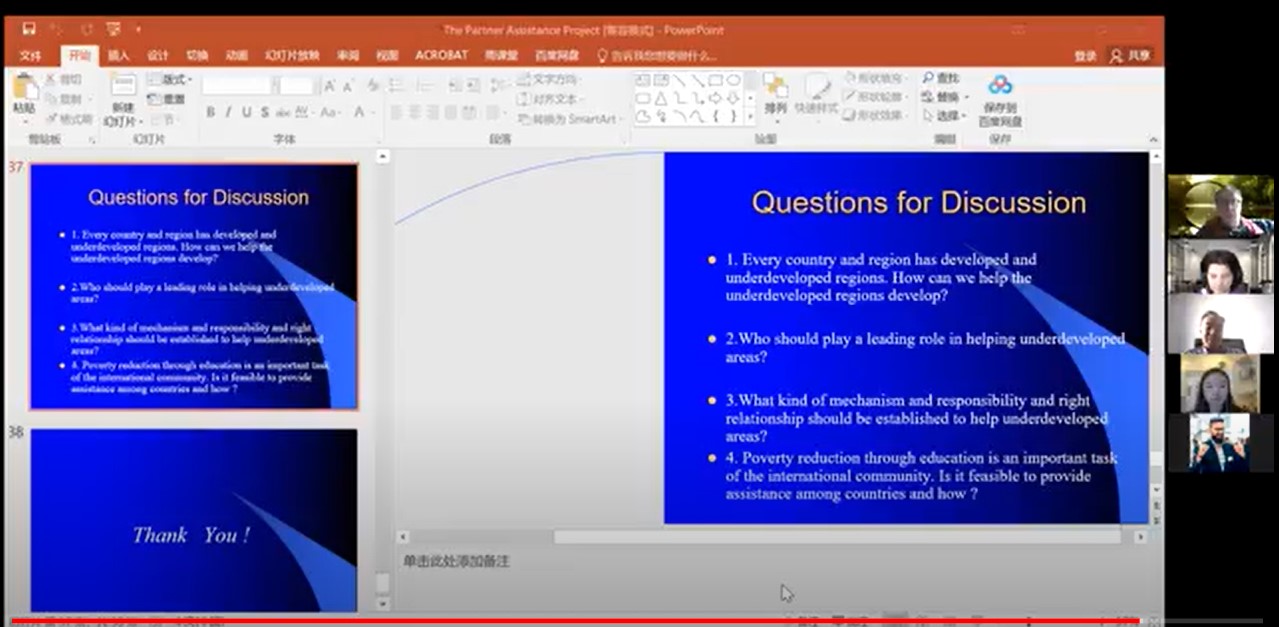 On the first day Professor Liu gave a comprehensive overview of the Chinese higher education landscape and then presented a model of cooperation in higher education between more and less developed regions of the country. The participants was provided the opportunity to look at the presented large scale project from all angles and discuss strength, weaknesses, opportunities and threats also putting forward their own ideas and suggestions during a stimulating discussion around the inspiring questions: How can we help the underdeveloped regions develop? Who should play a leading role in helping underdeveloped areas? What kind of mechanism and responsibility and right relationship should be established to help underdeveloped areas? Poverty reduction through education is an important task of the international community. Is it feasible to provide assistance among countries and how?
On the first day Professor Liu gave a comprehensive overview of the Chinese higher education landscape and then presented a model of cooperation in higher education between more and less developed regions of the country. The participants was provided the opportunity to look at the presented large scale project from all angles and discuss strength, weaknesses, opportunities and threats also putting forward their own ideas and suggestions during a stimulating discussion around the inspiring questions: How can we help the underdeveloped regions develop? Who should play a leading role in helping underdeveloped areas? What kind of mechanism and responsibility and right relationship should be established to help underdeveloped areas? Poverty reduction through education is an important task of the international community. Is it feasible to provide assistance among countries and how?
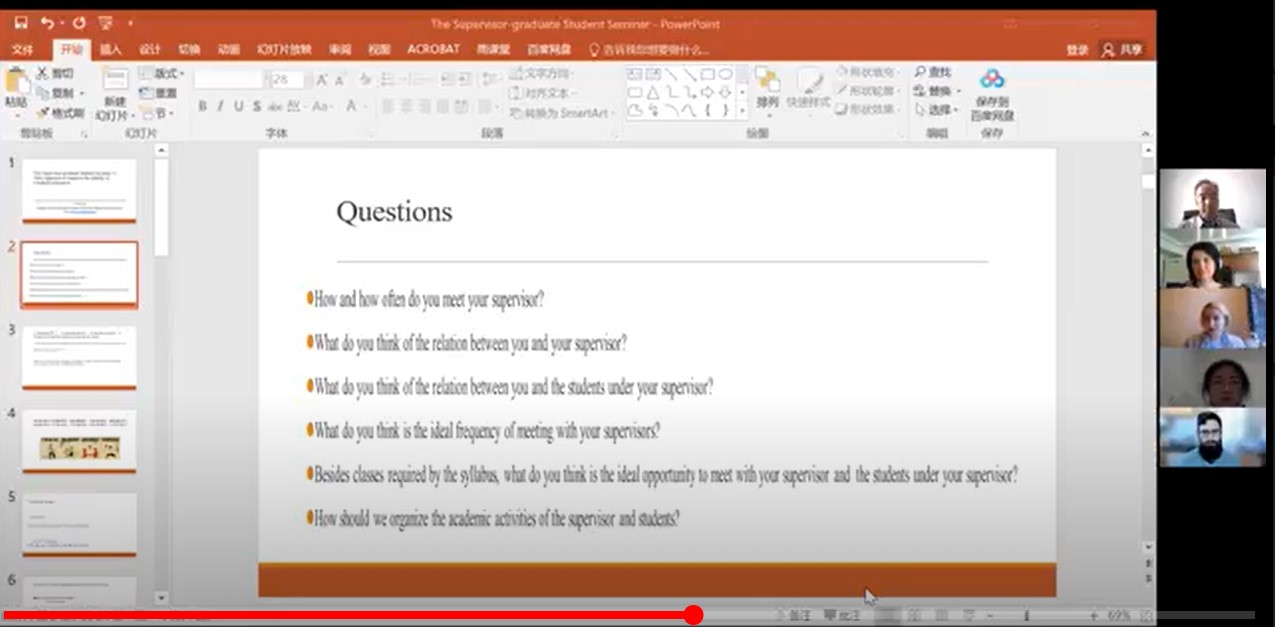 On the second day Professor Liu focused on the relationship between supervisors and students, the organisational culture of the academic community of students and supervisors in China, called “Shimen” and a new approach to improve the quality of graduate education, a supervisor-graduate seminar, called “Shimenhui”. Finally the group discussed the challenges and problems of supervision in general and of the Shimenhui in particular.
On the second day Professor Liu focused on the relationship between supervisors and students, the organisational culture of the academic community of students and supervisors in China, called “Shimen” and a new approach to improve the quality of graduate education, a supervisor-graduate seminar, called “Shimenhui”. Finally the group discussed the challenges and problems of supervision in general and of the Shimenhui in particular.
Helena Kovacs, Ph.D, scientific collaborator (LEARN Centre, École Polytechnique Fédérale de Lausanne): Knowledge sharing and research project at LEARN
Date: 13, 14 May 9am-10.30am
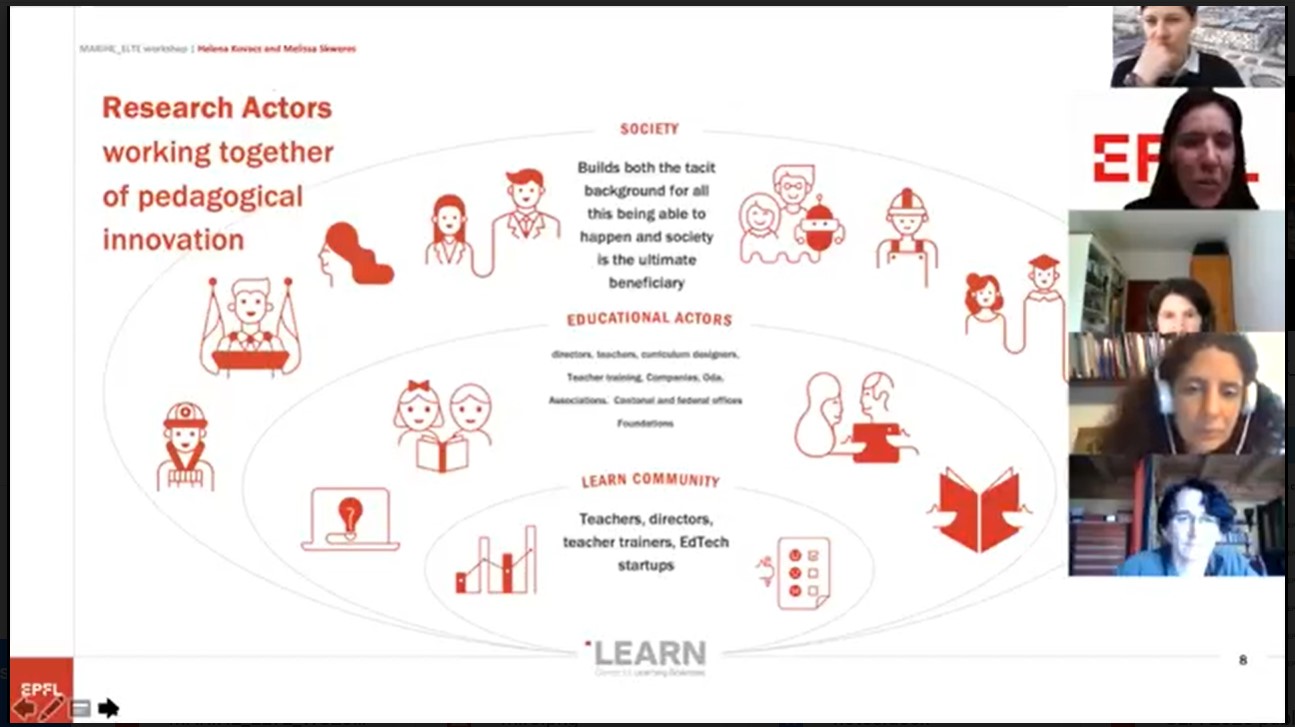 On the first day the presenter (Helena Kovac, scientific collaborator at the Center for Learning Sciences, LEARN) and her invited guest (Melissa Skweres, a primary school English teacher and facilitator of knowledge sharing and transfer between LEARN and Swiss public schools) gave a short introduction to the structure of the LEARN and analysed the processes that support and hinder knowledge transfer within the academic organisation. In the second part of the workshop the facilitators presented knowledge development through the example of LEARN external mission.
On the first day the presenter (Helena Kovac, scientific collaborator at the Center for Learning Sciences, LEARN) and her invited guest (Melissa Skweres, a primary school English teacher and facilitator of knowledge sharing and transfer between LEARN and Swiss public schools) gave a short introduction to the structure of the LEARN and analysed the processes that support and hinder knowledge transfer within the academic organisation. In the second part of the workshop the facilitators presented knowledge development through the example of LEARN external mission.
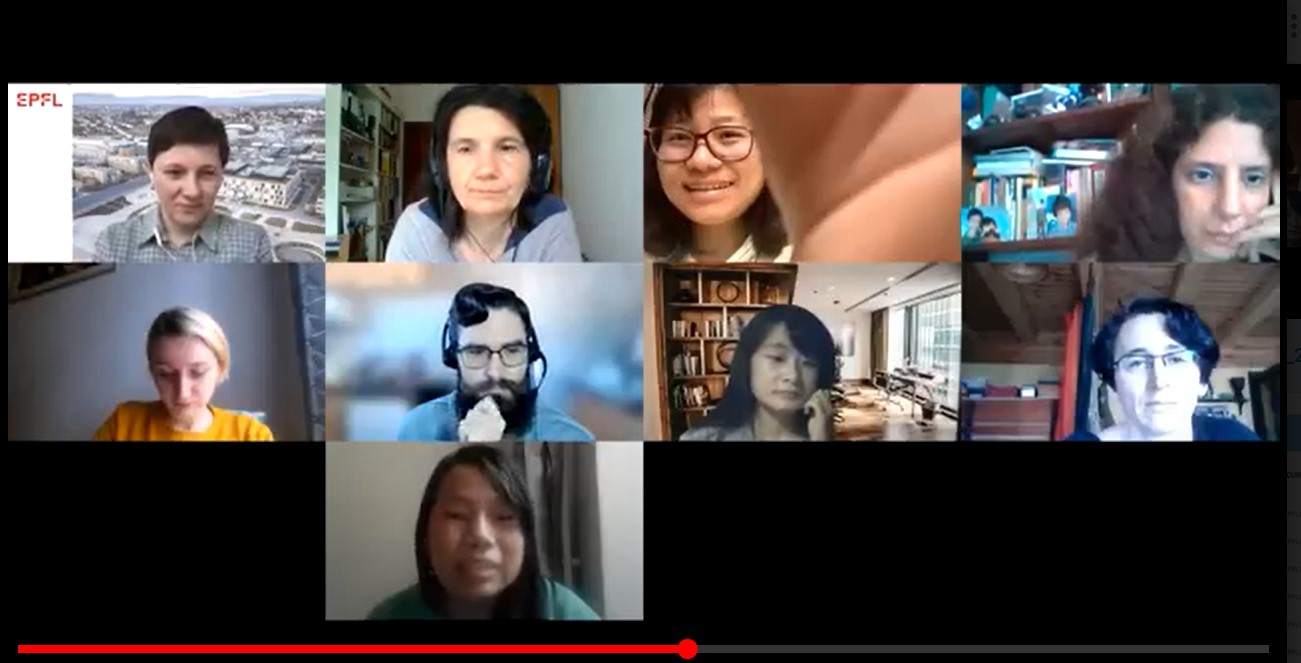 On the second day participants gained insights into educational research in engineering education by looking into two examples. In the first case a presentation of research on transversal skills provided opportunities to discuss challenges of creating comprehensive understanding of competence-based learning and teaching, while the second example presented aspects of research on teaching under lockdown.
On the second day participants gained insights into educational research in engineering education by looking into two examples. In the first case a presentation of research on transversal skills provided opportunities to discuss challenges of creating comprehensive understanding of competence-based learning and teaching, while the second example presented aspects of research on teaching under lockdown.
Prof. Melita Kovačević (University of Zagreb): Quality and Management of Doctoral Training in an International Context, and the Impacts of COVID-19
Date: 18, 20 May 9am-10.30am
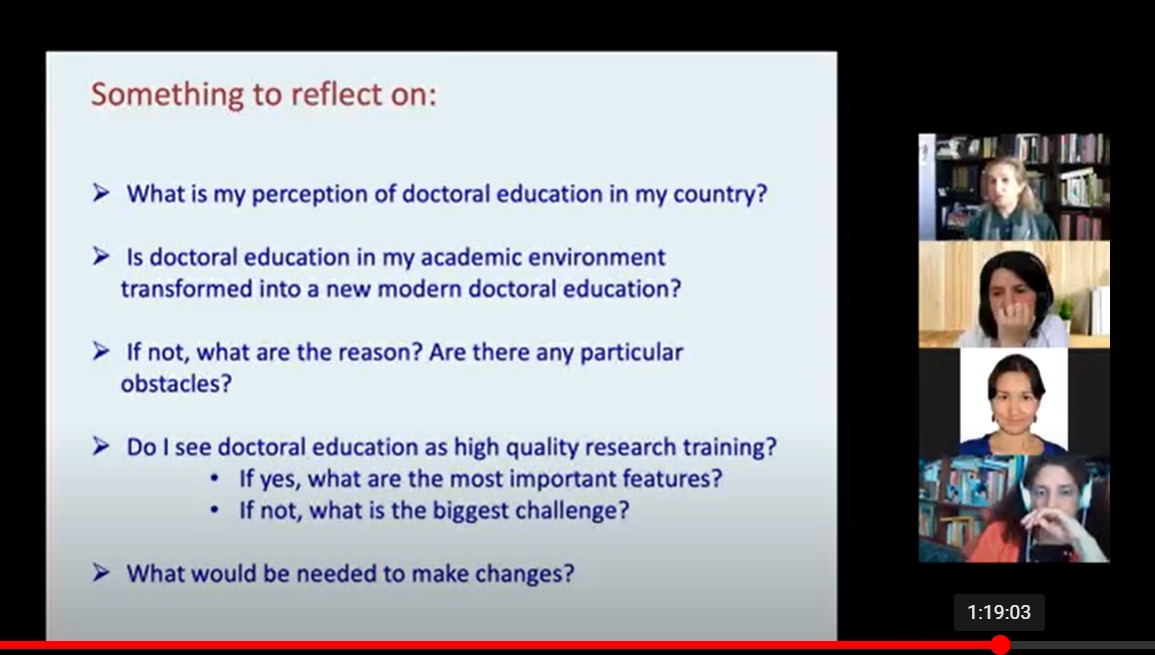 During Prof. Kovačević’ workshop participants got familiarised with the following questions: in the context of doctoral education, what has been done in the past decade, where are we now and what is in front of us? What are the principles of innovative doctoral training? What makes a high-quality doctoral education? What are the key issues? What makes a great supervisor? The participants reflected on their own doctoral education and discussed the questions raised during the workshop.
During Prof. Kovačević’ workshop participants got familiarised with the following questions: in the context of doctoral education, what has been done in the past decade, where are we now and what is in front of us? What are the principles of innovative doctoral training? What makes a high-quality doctoral education? What are the key issues? What makes a great supervisor? The participants reflected on their own doctoral education and discussed the questions raised during the workshop.
Gorana Misic, Ph.D (Bard College Berlin): University Preparation Programs for Refugees
Date 4, 7, 9, 10 June 10am-11.30am
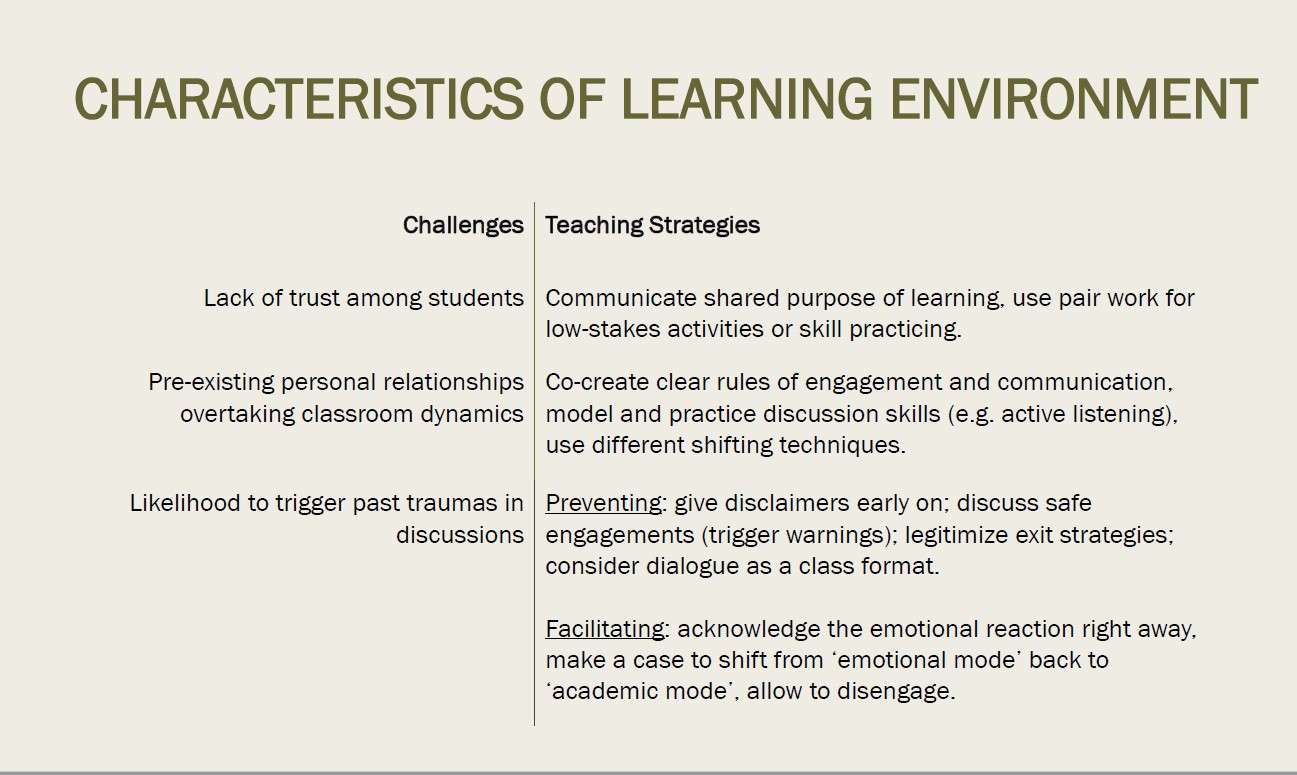 This workshop consisted of four 90-min sessions, and focused on institutional support and management, as well as curriculum design, pedagogy and teaching approaches in such programs. Some of the common issues the workshop covered in this context included overall program design, including policy issues such as recognition of educational qualifications, institutional support, funding and scholarships, as well as curriculum design and teaching practices that promote inclusion, diversity, and language and academic skills learning.
This workshop consisted of four 90-min sessions, and focused on institutional support and management, as well as curriculum design, pedagogy and teaching approaches in such programs. Some of the common issues the workshop covered in this context included overall program design, including policy issues such as recognition of educational qualifications, institutional support, funding and scholarships, as well as curriculum design and teaching practices that promote inclusion, diversity, and language and academic skills learning.
On the first day participants familiarised with the challenges that refugees are facing if they want to continue their education in a new country and the things to consider when designing a program that help them prepare for that. The next day a detailed analysis of the design of such programs was made. On the third day participants designed a hypothetical course by determining the scope and needs of students, the objectives and type of the prep program, and analysed a case study to see how other programs set requirements and drew lessons from that. On the last day participants learnt about trauma-informed teaching and investigated different “what went wrong” scenarios and attempted to find solutions (develop strategies).
MARIHE students at the Semmelweis University -27 May 2021
The students of the Master in Research and Innovation in Higher Education program will demonstrate the practical application of the Guide for University Teachers to Enhance the Effectiveness of Group Work, that they prepared during the course by ass. prof. Orsolya Kálmán and László Horváth „Innovation in Teaching and Learning” at Semmelweis University in a workshop series of the Centre for Educational Development, Methodology and Organisation.
The Guide is available here. The short (14-minute) video on the presentation of how the Guide was prepared is available here.
* date: 27 May 2021, 16-18h
* location: zoom (link will be sent to the email address you provided when registering)
* registration: http://bit.ly/EGW-workshop (Before registering, please review the guide, as in order to make the programme as effective and personalised as possible, the short questionnaire will include questions on areas of interest within the content of the guide.)
MARIHE students at Semmelweis University - 13 May 2021
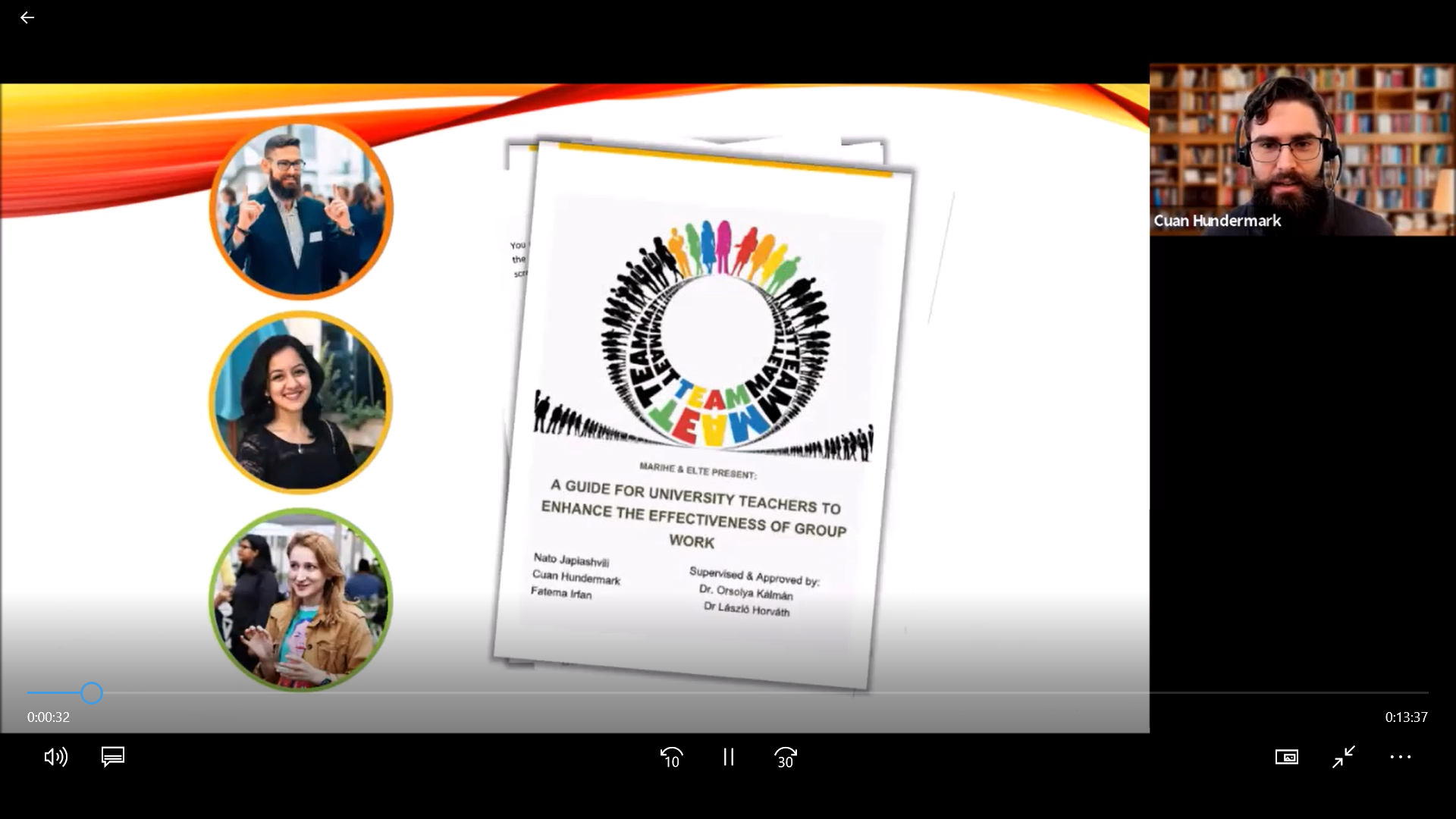 Students of the MARIHE program graduating this semester presented an interactive Guide on online education and group work for faculty members of the Semmelweis University in April 2021. The Guide was prepared during the course Innovation in Teaching and Learning held by Orsolya Kálmán and László Horváth and presented at the EduIdea workshop series organised by Borbála Kozma, who works for the Centre for Educational Development, Methodology and Organisation at Semmelweis and is a doctoral student in the EDiTE program of the Doctoral School of Education. The goals of the workshop series is to share good practices and experiences of teaching. Following the interest shown during the short presentation, the students will present and discuss the Guide in the frame of a 2-hour workshop at Semmelweis University in May. If you are interested in the Guide, please send an email to Judit Saád project manager saad.judit@ppk.elte.hu.
Students of the MARIHE program graduating this semester presented an interactive Guide on online education and group work for faculty members of the Semmelweis University in April 2021. The Guide was prepared during the course Innovation in Teaching and Learning held by Orsolya Kálmán and László Horváth and presented at the EduIdea workshop series organised by Borbála Kozma, who works for the Centre for Educational Development, Methodology and Organisation at Semmelweis and is a doctoral student in the EDiTE program of the Doctoral School of Education. The goals of the workshop series is to share good practices and experiences of teaching. Following the interest shown during the short presentation, the students will present and discuss the Guide in the frame of a 2-hour workshop at Semmelweis University in May. If you are interested in the Guide, please send an email to Judit Saád project manager saad.judit@ppk.elte.hu.
MARIHE workshop series continues
During May- June 2021 visiting professors and education experts will hold online workshops for the MARIHE students. The workshops are also open to faculty, Ph.D and master students in limited numbers. Register by sending an email to saad.judit@ppk.elte.hu.
The workshops are scheduled as follows:
3, 4 May 10am-12.30pm
Helga Dorner, Ph.D (ELTE PPK): Teaching and Learning, Pedagogic Innovations and Academic Development in Higher Education
Ass. Prof. Helga Dorner’s workshop focused around the main questions: 1) How to develop a university’s teaching and learning? 2) What are sites and stakeholders to be involved? 3) How can these activities be assessed? 4) How may evidence-based enhancement of teaching and learning be done?
The ten participants worked together actively based on the rich input provided by the lecturer and supported by several important literature in the field (Stensaker et al, 2017; Gibbs, 2013; Kreber& Brook, 2001), looking at impact evaluations of educational development programs and making reflections on two university cases (MIT and Helsinki University).
10, 11 May 9am-10.30am
Prof. Liu Baocun (Beijing Normal University): The Partner Assistance Project: an Attempt to Promote Balanced Development in Higher Education Between the West and the East in China; The Supervisor-graduate Student Seminar: A New Approach to Improve The Quality of Graduate Education
13, 14 May 9am-10.30am
Helena Kovacs, Ph.D, scientific collaborator (LEARN Centre, École Polytechnique Fédérale de Lausanne): Knowledge sharing and research project at LEARN
18, 20 May 9am-10.30am
Prof. Melita Kovačević (University of Zagreb): Quality and Management of Doctoral Training in an International Context, and the Impacts of COVID-19
4, 7, 9, 10 June 10am-11.30am
Gorana Misic, Ph.D (Bard College Berlin): University Preparation Programs for Refugees
The MARIHE lecture and workshop series has started - 6 January 2021
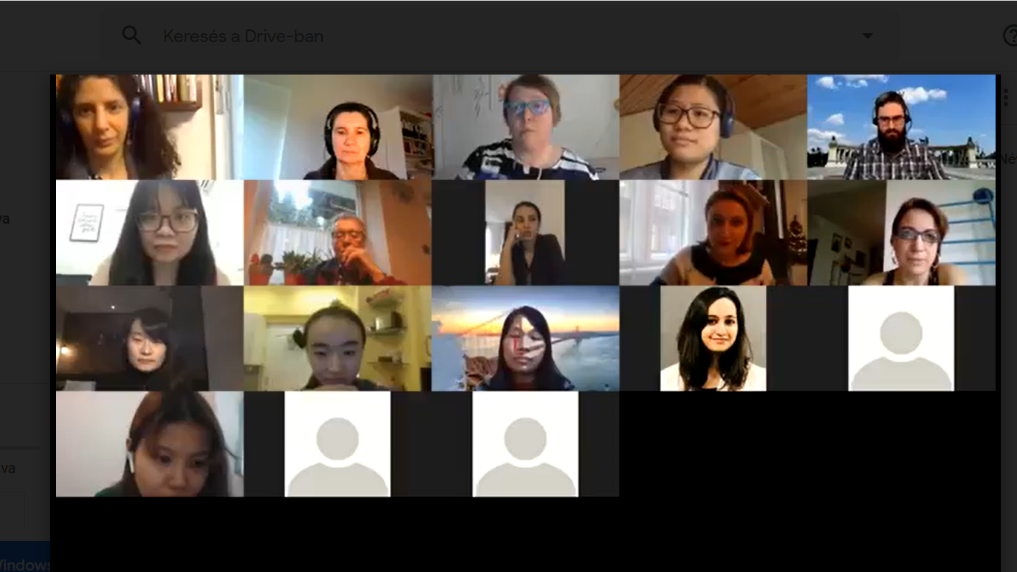 In the framework of the Master in Research and Innovation in Higher Education (MARIHE) programme, Dr Terhi Skaniakos, education development, teacher training expert and coach, gave a lecture and workshop on educational development in higher education, as well as an exciting higher education development model currently underway at the University of Jyväskylä.
In the framework of the Master in Research and Innovation in Higher Education (MARIHE) programme, Dr Terhi Skaniakos, education development, teacher training expert and coach, gave a lecture and workshop on educational development in higher education, as well as an exciting higher education development model currently underway at the University of Jyväskylä.
The MARIHE program kicks off at ELTE - 14 November 2019
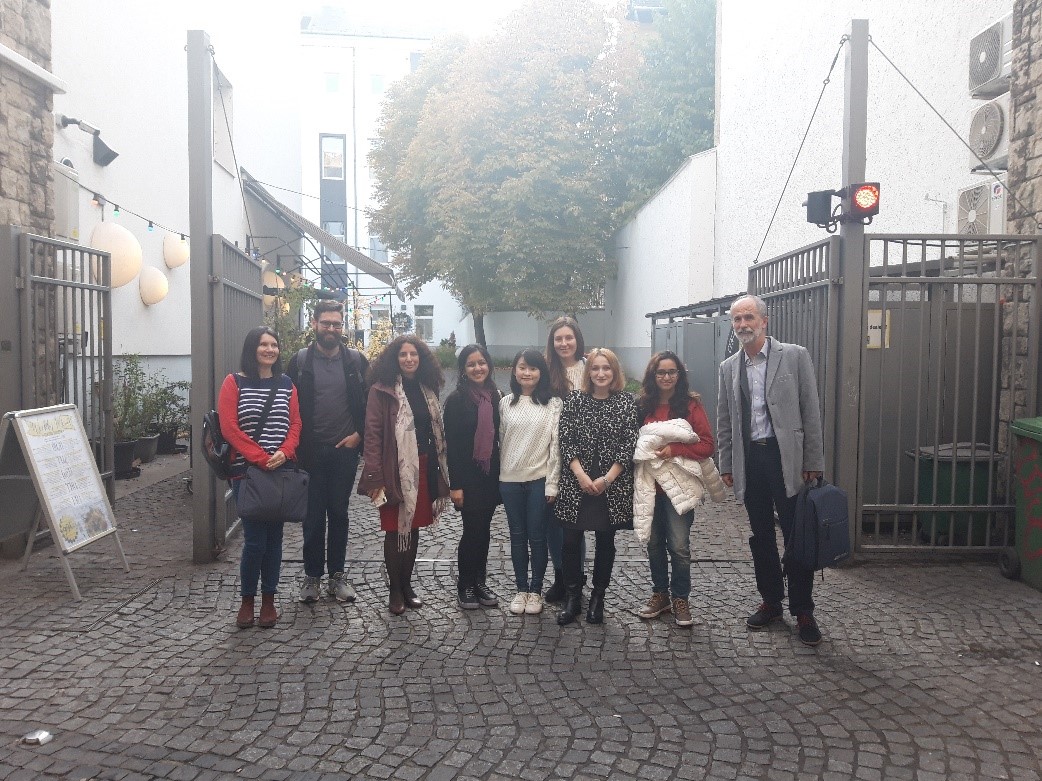 On 14 November, six international students enrolled at ELTE PPK for the 2019/2021 Erasmus Mundus Master in Research and Higher Education (MARIHE) programme, who chose the Institute of Education's track in Learning and Teaching from the consortium's recommended specialisations. The students were able to meet the training programme directors, lecturers and potential subject supervisors, and participated in a workshop on the EDiTE programme of the English Doctoral School of Education.
On 14 November, six international students enrolled at ELTE PPK for the 2019/2021 Erasmus Mundus Master in Research and Higher Education (MARIHE) programme, who chose the Institute of Education's track in Learning and Teaching from the consortium's recommended specialisations. The students were able to meet the training programme directors, lecturers and potential subject supervisors, and participated in a workshop on the EDiTE programme of the English Doctoral School of Education.

